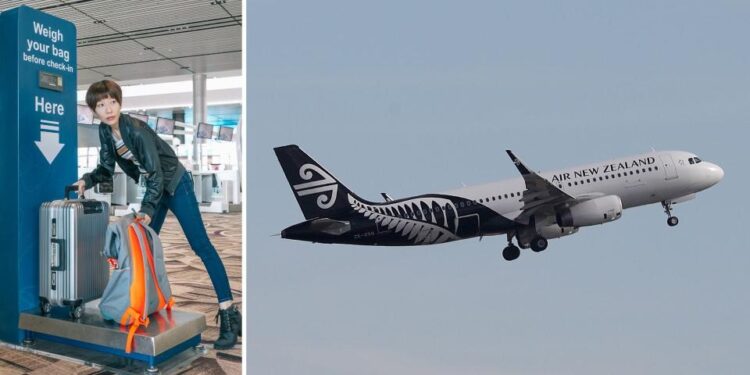Air New Zealand Implements Passenger Weighing Program to Enhance Flight Safety: Striking the Balance for Safer Skies:
In a bid to enhance flight safety and ensure optimal weight distribution on its aircraft, Air New Zealand, the country’s national airline, has announced a unique initiative requiring passengers to step on scales before boarding international flights. The month-long survey aims to collect data from 10,000 passengers, enabling pilots to have a more accurate understanding of the weight and balance of their planes before takeoff. This article delves into the details of the program, its rationale, and the potential impact it may have on passengers and the aviation industry as a whole.
Setting the Stage for Safer Skies:
Air New Zealand’s decision to implement a passenger weighing program has generated considerable interest and raised pertinent questions about flight safety protocols. The initiative seeks to address a crucial aspect of aviation operations – the accurate assessment of an aircraft’s weight and balance. By obtaining precise passenger weight data, the airline aims to optimize safety and efficiency during flight operations.
The Month-Long Survey:
The month-long survey, set to involve 10,000 passengers, will be conducted on selected international flights departing from New Zealand. Air New Zealand plans to gather this data using discrete and voluntary weigh-ins at the gate, ensuring passenger privacy and comfort throughout the process.
While participation in the survey is not mandatory, the airline has emphasized the importance of obtaining a representative sample to ensure accurate data collection. Passengers will be randomly selected and invited to participate, with their weights recorded alongside other relevant information such as luggage weight.
Enhancing Flight Safety:
The weight and balance of an aircraft are critical factors that influence its overall performance and stability. Accurate calculations of these variables enable pilots to make informed decisions during crucial flight phases, such as takeoff and landing. By gathering passenger weight data, Air New Zealand aims to improve the accuracy of these calculations, allowing pilots to make more precise adjustments and optimize the safety and efficiency of their flights.
Traditionally, airlines have relied on estimated passenger weight averages to determine the total weight of passengers on board. However, this approach may not always reflect the true weight distribution across different flights, potentially compromising flight safety. The introduction of individual passenger weighing provides a more accurate picture of the aircraft’s weight, ensuring optimal load distribution and reducing potential risks.
Responding to Safety Regulations and Industry Trends:
Air New Zealand’s passenger weighing program aligns with international safety regulations and reflects industry trends aimed at further enhancing aviation safety. The International Civil Aviation Organization (ICAO) recommends that airlines regularly update weight and balance information to maintain optimal operational conditions.
Furthermore, the aviation industry has witnessed a significant evolution in aircraft design and technology, resulting in a greater emphasis on precise weight distribution. As modern aircraft continue to push the boundaries of efficiency and performance, accurate weight and balance calculations become even more crucial for safe and successful flights.
Passenger Privacy and Sensitivity:
Recognizing the sensitivity of gathering personal information such as weight, Air New Zealand assures passengers that their privacy and dignity will be respected throughout the weighing process. The airline emphasizes that the collected data will be handled with utmost confidentiality, complying with privacy regulations and ethical guidelines.
To alleviate any concerns, Air New Zealand has made participation in the survey entirely voluntary. Passengers who do not wish to participate will not face any penalties or consequences. The aim is to encourage a transparent and respectful approach, ensuring passenger comfort while gathering valuable data for the benefit of flight safety.
Balancing Safety and Passenger Experience:
Air New Zealand’s decision to implement a passenger weighing program represents a delicate balancing act between prioritizing safety and maintaining positive passenger experiences. The airline acknowledges that the process may initially create logistical challenges, requiring adjustments to boarding procedures to accommodate the additional step.
Efforts are underway to streamline the process and ensure minimal disruption to the passenger experience. Air New Zealand has committed to providing clear communication and assistance to passengers throughout the weighing process, aiming to make it as efficient and seamless as possible. The airline recognizes that open and transparent communication is crucial to building trust and maintaining customer satisfaction.
Industry Impact and Potential Future Applications:
Air New Zealand’s passenger weighing program has garnered attention not only within the aviation industry but also among other airlines and regulatory bodies worldwide. The program sets a precedent for incorporating more accurate passenger weight data into flight operations, potentially leading to industry-wide changes in weight and balance calculations.
By adopting such initiatives, airlines can further enhance flight safety and efficiency, enabling pilots to make more informed decisions based on precise data. This move aligns with the industry’s continuous efforts to embrace technological advancements and improve operational practices.
Potential benefits extend beyond safety considerations. More accurate weight data could also contribute to fuel efficiency, as airlines can optimize fuel calculations based on precise passenger and cargo weights. This, in turn, has the potential to reduce costs and environmental impact, aligning with the industry’s commitment to sustainability.
Public Reaction and Stakeholder Perspectives:
The introduction of Air New Zealand’s passenger weighing program has elicited mixed reactions from the public and various stakeholders. Advocates emphasize the importance of prioritizing safety and appreciate the airline’s proactive approach in implementing measures to enhance flight operations.
Critics, however, express concerns over privacy, potential discrimination, and the psychological impact of public weight measurements. It is essential for airlines to address these concerns transparently and implement measures that prioritize passenger comfort, privacy, and well-being.
Moving Forward: Ensuring Ethical Implementation:
As the passenger weighing program progresses, Air New Zealand must navigate potential ethical challenges and ensure that the program’s implementation aligns with established guidelines and regulations. Transparent communication, respect for passenger privacy, and addressing concerns regarding discrimination and body image are vital elements in the successful and ethical execution of the initiative.
Air New Zealand has an opportunity to set industry standards for the ethical implementation of passenger weighing programs. Collaborating with regulatory bodies, industry experts, and passenger advocacy groups will be crucial in developing comprehensive guidelines that prioritize safety without compromising passenger rights and well-being.
Air New Zealand’s decision to implement a passenger weighing program represents a significant step forward in enhancing flight safety and operational efficiency. By collecting accurate weight data, the airline aims to optimize aircraft balance, reduce potential risks, and improve fuel efficiency.
While the program has raised valid concerns regarding privacy and potential discrimination, it is crucial for Air New Zealand and other industry stakeholders to address these concerns transparently and implement safeguards to protect passenger rights and well-being.
The success of this initiative will depend on the airline’s ability to strike a balance between safety, passenger experience, and ethical considerations. By navigating these challenges effectively, Air New Zealand can potentially set industry standards and inspire other airlines to adopt similar programs, ultimately contributing to safer skies and more efficient operations in the global aviation industry.



No Comments
Leave Comment